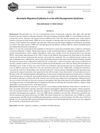 May 2022 in “bioRxiv (Cold Spring Harbor Laboratory)”
May 2022 in “bioRxiv (Cold Spring Harbor Laboratory)” The enzyme 5α-reductase is important for proper blood vessel development during the fertility-related transformation of the uterus lining.

No single biomarker is reliable enough for diagnosing and assessing SLE.

The document concludes that the development of certain tumors is influenced by genetic background and that a specific gene modification can lead to tumor regression and reduced growth.
 February 2022 in “International journal of KIU”
February 2022 in “International journal of KIU” Certain genes and nutrients like vitamin D, zinc, and omega fatty acids affect COVID-19 severity and infection risk.

Researchers found a genetic link for hereditary hair loss but need more analysis to identify the exact gene.
 July 2021 in “Research Square (Research Square)”
July 2021 in “Research Square (Research Square)” Semecarpus anacardium leaf extract fights breast cancer and extends survival in mice.

Silk sericin dressing with collagen heals wounds faster and improves scar quality better than Bactigras.
 January 2020 in “arXiv (Cornell University)”
January 2020 in “arXiv (Cornell University)” Some existing drugs and natural products might work against COVID-19 by targeting the virus's main protease.
 November 2019 in “Harper's Textbook of Pediatric Dermatology”
November 2019 in “Harper's Textbook of Pediatric Dermatology” Understanding normal hair growth and loss in children is key to diagnosing and treating hair disorders.
 January 2019 in “Springer eBooks”
January 2019 in “Springer eBooks” Acne is linked to inflammation and insulin resistance, and is associated with various syndromes that require different treatments.
 January 2019 in “Journal of cosmetology & trichology”
January 2019 in “Journal of cosmetology & trichology” L-Cystine and L-Cystine with Kera-Diet® safely improved hair and nail quality in healthy women.
 October 2018 in “Journal of the European Academy of Dermatology and Venereology”
October 2018 in “Journal of the European Academy of Dermatology and Venereology”  June 2017 in “Acta Scientiae Veterinariae”
June 2017 in “Acta Scientiae Veterinariae” A cat with a rare pancreatic tumor and diabetes died despite treatment, showing similar symptoms to a human condition.
 January 2017 in “International journal of clinical & experimental dermatology”
January 2017 in “International journal of clinical & experimental dermatology” Eating a balanced diet with vitamins, micronutrients, and antioxidants is important for hair health and can help with hair loss.
 January 2017 in “Clinical approaches and procedures in cosmetic dermatology”
January 2017 in “Clinical approaches and procedures in cosmetic dermatology” Certain nutrients can improve skin health and treat skin problems safely.
 January 2017 in “Elsevier eBooks”
January 2017 in “Elsevier eBooks” Stress and hormones like progesterone can affect absence seizures, but their effects change with different life stages.

The conclusion is that endocrinology significantly impacts medicine with various common medications used for treatment.
 November 2016 in “Elsevier eBooks”
November 2016 in “Elsevier eBooks” Genetic mutations can affect female sexual development, requiring personalized medical care.
 April 2016 in “Journal of The American Academy of Dermatology”
April 2016 in “Journal of The American Academy of Dermatology” A vitamin and mineral supplement significantly reduced hair shedding in Brazilian women with telogen effluvium.
 April 2016 in “Journal of The American Academy of Dermatology”
April 2016 in “Journal of The American Academy of Dermatology” Certain scalp tissue features can predict how well alopecia areata responds to steroid injections.
 November 2014 in “Elsevier eBooks”
November 2014 in “Elsevier eBooks” Gene mutations can cause problems in male genital development.
 September 2014 in “Springer eBooks”
September 2014 in “Springer eBooks” Aging causes hair to gray and thin, with the timing of graying varying by race, and factors like oxidative stress and genetics can lead to hair loss.
 June 2012 in “Springer eBooks”
June 2012 in “Springer eBooks” Skin changes can indicate starvation and nutritional deficiencies in anorexia nervosa.
 February 2012 in “InTech eBooks”
February 2012 in “InTech eBooks” PCOS increases the risk of heart disease and type 2 diabetes in women.
 January 2012 in “Methods in pharmacology and toxicology”
January 2012 in “Methods in pharmacology and toxicology” TRPV3 could be a target for treating pain, skin disorders, and hair problems, but more research is needed to create effective drugs.
 January 2011 in “Springer eBooks”
January 2011 in “Springer eBooks” Eating a balanced diet with the right vitamins and minerals is important for healthy hair, but too many supplements can be harmful.
 January 2009 in “Elsevier eBooks”
January 2009 in “Elsevier eBooks” Some plant-based treatments may help with ovary function, insulin resistance, and excess male hormones in PCOS, but more research is needed to confirm their safety and effectiveness.
 June 2008 in “British Journal of Dermatology”
June 2008 in “British Journal of Dermatology” UK medical students lack dermatology education, liver biopsy patients with risk factors show more fibrosis, and certain fungi resist drugs due to melanin; genetics may influence female hair loss.
 September 2004 in “Experimental dermatology”
September 2004 in “Experimental dermatology” Melatonin directly affects mouse hair follicles and may influence hair growth.
 October 2003 in “Journal of Investigative Dermatology Symposium Proceedings”
October 2003 in “Journal of Investigative Dermatology Symposium Proceedings” Mice treatments didn't grow hair, a patient treatment may affect immune response, and people with hair loss often feel anxious or depressed.






























